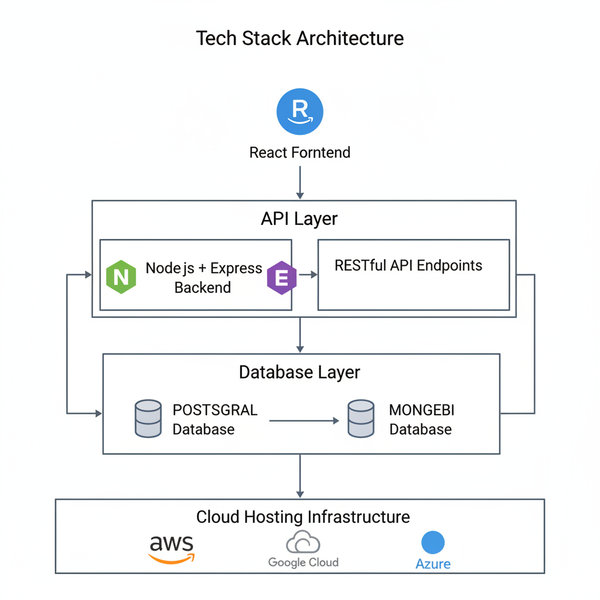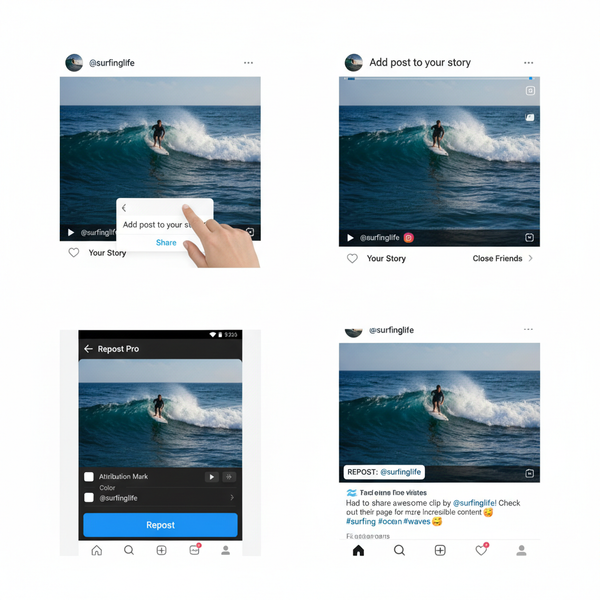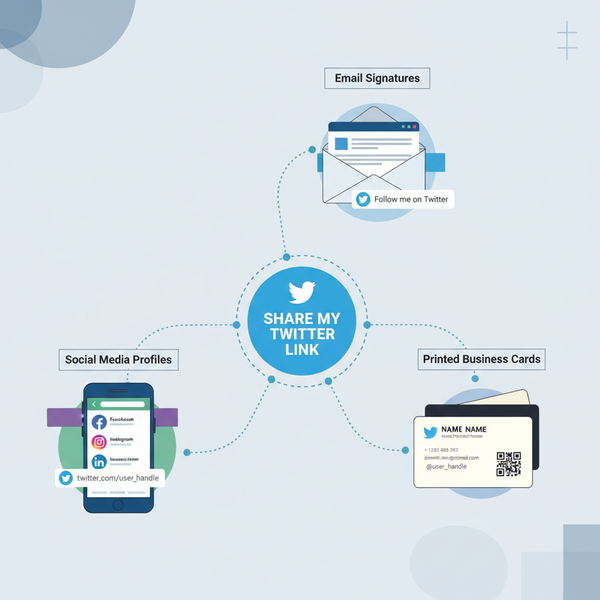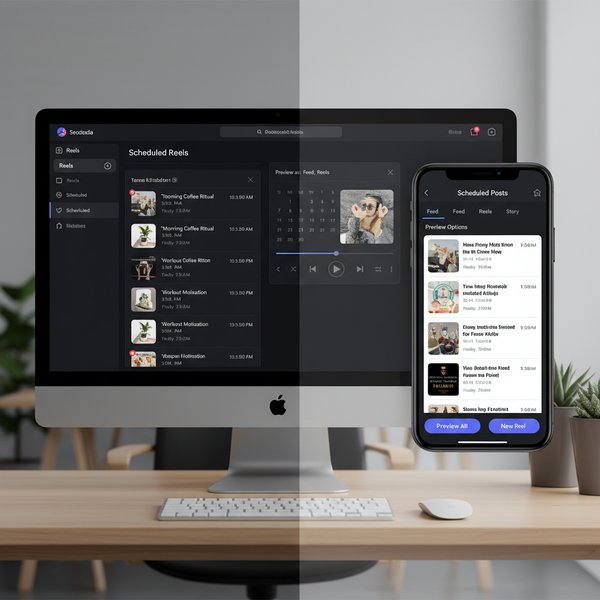Google Sheets Instagram Content Calendar Template Guide
Learn how to create a structured Instagram content calendar in Google Sheets to plan posts, manage themes, and improve consistency and engagement.
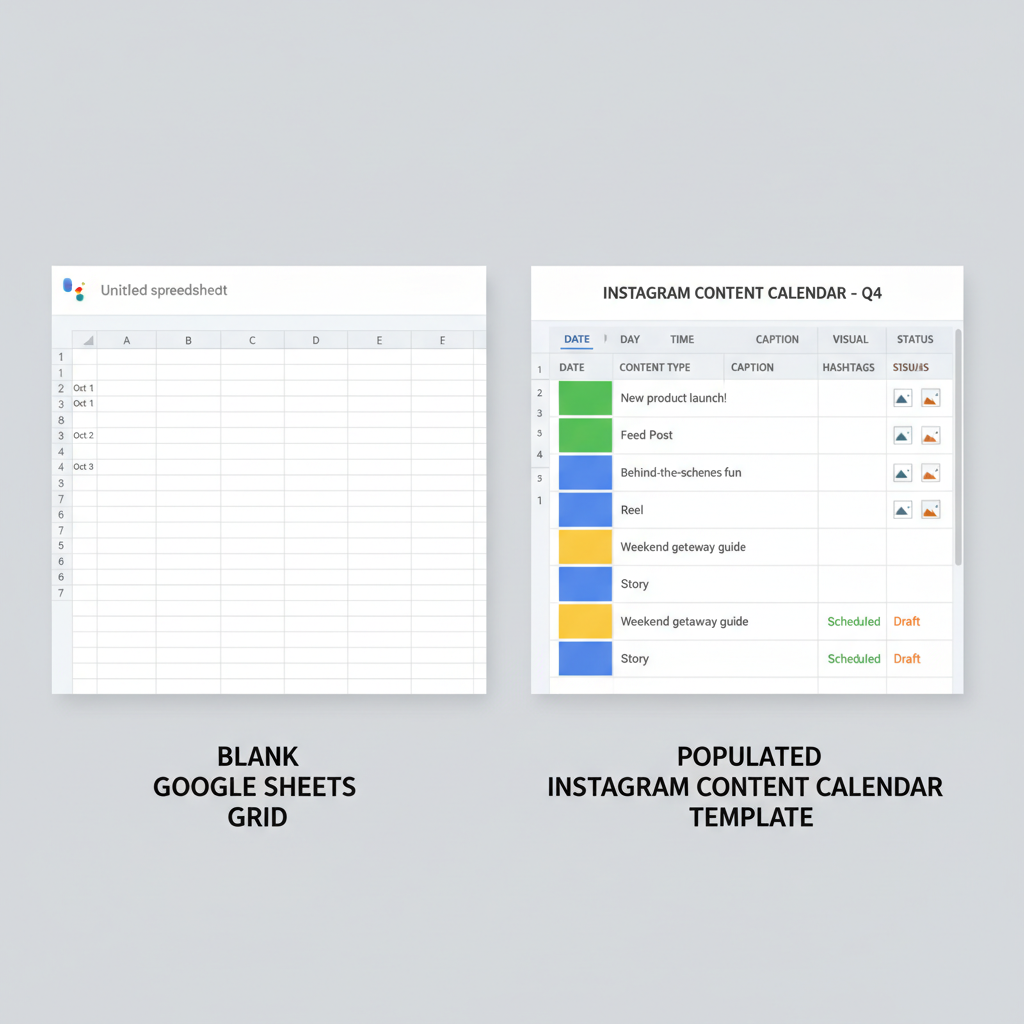
Introduction: Plan for Consistent Growth with a Google Sheets Instagram Content Calendar Template
If you’re serious about growing your Instagram presence, having a consistent content posting schedule isn’t optional — it’s essential. A well-structured Instagram content calendar keeps your posting cadence steady, ensures thematic consistency, and allows you to respond quickly to trends without derailing your long-term strategy. Using a Google Sheets Instagram content calendar template gives you a powerful yet simple way to organize, track, and optimize every post for engagement.
Without a content calendar, it’s easy to fall into a cycle of last-minute posts or inconsistencies that confuse your audience and hurt reach. By structuring your calendar in Google Sheets, you combine accessibility, collaboration, and adaptability into one tool.

---
Why Choose a Google Sheets Instagram Content Calendar Template
Google Sheets is a free, cloud-based platform that works on any device. It’s ideal for marketers, small business owners, or influencers who want to:
- Access and update plans from anywhere.
- Collaborate in real time with team members.
- Avoid the learning curve of complex project management tools.
- Keep costs minimal while maintaining flexibility.
With a Google Sheets Instagram content calendar template, you can build a tailored system without paying for complex subscription-based tools.
---
Step-by-Step: Building Your Template Structure in Google Sheets
The backbone of a Google Sheets Instagram content calendar template relies on clear, structured data. Let’s break it down.
1. Create a Date Column
Add a column labeled Date, formatted to show the day and month of each planned post.
2. Define Post Types
Include a Post Type column to specify whether each post will be:
- Feed post
- Reel
- Story
- Carousel
3. Identify Content Pillars
Set core themes to guide your strategy:
- Educational
- Inspirational
- Entertaining
- Promotional
---
Example Core Template Structure
| Date | Post Type | Content Pillar | Caption | Hashtags | Media Link | Status |
|---|---|---|---|---|---|---|
| 2024-07-01 | Reel | Inspirational | “Chase your dreams every day.” | #motivation #dailyinspo | drive.google.com/... | Scheduled |
| 2024-07-03 | Carousel | Educational | “5 Tips for Better Photography” | #contentstrategy #instatips | drive.google.com/... | Draft |
---
Adding Columns for Essential Content Details
To maximize efficiency, expand your template with these fields:
- Captions – Draft and edit directly in the cell.
- Hashtags – Organize ready-to-use hashtag groups.
- Image/Video Links – Add URLs to files stored in Google Drive.
- Status – Mark each post as “Idea,” “Draft,” “Approved,” or “Scheduled.”
This structured approach makes it easy to hand off posts for approval or editing.
---
Color Coding for Quick Visual Organization
Color-coding helps you scan and interpret your planner rapidly. Use:
- Theme Colors – Assign a distinct color to each content pillar.
- Campaign Colors – Highlight special promotions or events.
- Priority Indicators – Mark urgent posts with bold red or a unique shade.
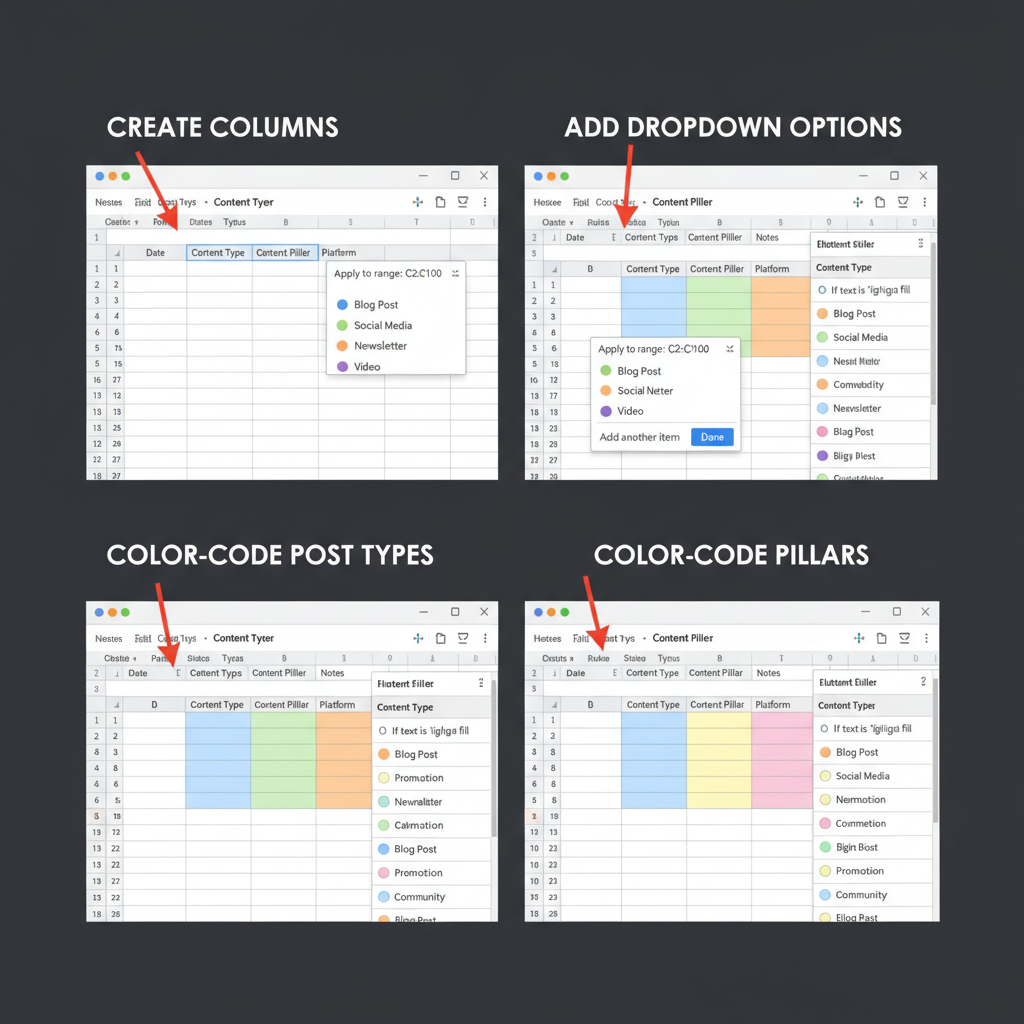
Setting Up Conditional Formatting in Google Sheets
- Select the relevant cells or range.
- Go to Format > Conditional formatting.
- Create rules based on cell text (e.g., “Contains ‘Educational’” then fill with blue).
- Save and repeat for each category.
---
Automating Your Template for Efficiency
Drop-Down Menus
Use Data validation so you can select options from pre-filled lists for post types, content pillars, and status.
Helpful Formulas
- `=TEXT(TODAY(),"MMMM")` – Display the current month.
- `=COUNTIF` – Track how many posts are planned for each content type.
- `=IF` functions – Automate status updates based on completion.
Conditional Formatting
Highlight posts with missing captions or media links to avoid errors.
---
Collaborating with Your Team via Google Drive
Since Google Sheets integrates with Google Drive, you can:
- Share your calendar with Viewer, Commenter, or Editor access.
- Tag colleagues in cells using `@username` for feedback.
- Keep assets (images, videos, hashtags) in a connected Drive folder.
Real-time collaboration cuts down on email threads and centralizes the workflow.
---
Tracking Monthly Instagram Analytics in Your Template
Reserve a separate sheet for analytics to keep your content strategy and performance linked.
Metrics to monitor:
- Engagement Rate (likes + comments + saves ÷ followers × 100)
- Reach
- Saves
- Shares
- Follower Growth
| Month | Posts Published | Average Engagement Rate | Total Reach | Total Saves |
|---|---|---|---|---|
| July | 20 | 4.8% | 58,000 | 420 |
| August | 18 | 5.2% | 62,500 | 510 |
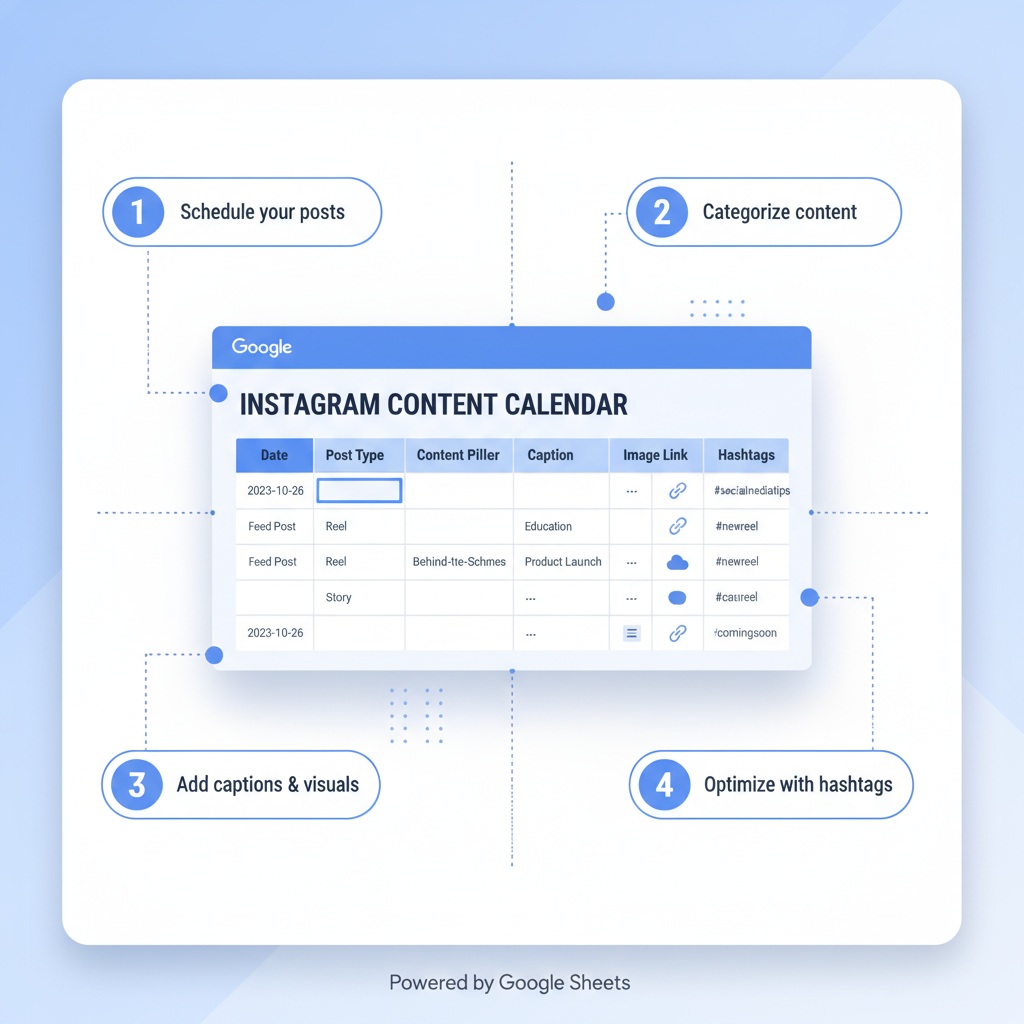
---
Tips for Batch Planning and Scheduling Posts
Batch planning — creating multiple posts in one sitting — offers benefits such as:
- Streamlined creative flow.
- Predictable workload.
- Easier campaign theming.
Use tools like Meta Business Suite, Buffer, or Later to schedule content after planning it in Google Sheets.
---
Weekly Review and Update Routine
Set a consistent schedule to:
- Analyze performance in your analytics sheet.
- Adjust content pillars if needed.
- Adapt posting times to audience behavior.
- Archive past months to maintain file efficiency.
---
Sample Template and Customization Ideas
Starting from a pre-built Google Sheets Instagram content calendar template saves setup time. Enhance it by:
- Adjusting columns to suit your workflow.
- Applying brand colors to headers.
- Adding notes fields for inspiration and links.
- Duplicating monthly sheets for each new time period.
For long-term campaigns, create a Year View tab showing high-level goals and promotions.
---
Conclusion: Make Your Google Sheets Instagram Content Calendar Work for You
An Instagram content calendar is more than a posting schedule; it’s the visual framework of your brand. By leveraging a Google Sheets Instagram content calendar template, you build:
- Consistent messaging.
- A clear view of the creative pipeline.
- Strong alignment with your marketing objectives.
Implementing this organized, collaborative, and data-driven approach ensures your Instagram growth is purposeful and scalable.
Ready to create your own? Open Google Sheets today, start laying out your columns, and bring structure to your Instagram strategy. Consistency starts with a clear plan — take the first step now.

